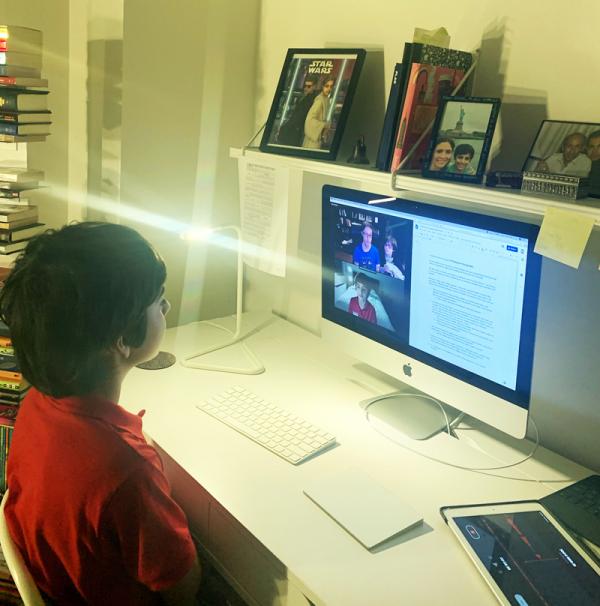KID REPORTERS’ NOTEBOOK
Election 2020: A Look Back


Before President Trump, says scholar Kermit Roosevelt, “there has never been an incumbent U.S. President who didn’t accept the results.”
On November 7, four days after Election Day, Democratic candidate Joseph R. Biden was declared President-elect. Biden had won the state of Pennsylvania with its 20 Electoral College votes, bringing him over the 270 electoral votes needed to win. Since then, his Republican opponent, President Donald J. Trump, has refused to congratulate Biden or allow for the transition of power to begin.
Hearing all of the “what if” scenarios, I wanted to learn more about the process of electing a President. Professor Kermit Roosevelt answered my questions via video. Roosevelt is a law professor at the University of Pennsylvania, as well as an author and a constitutional law expert. He is also a great-great-grandson of Theodore Roosevelt, who served as the President of the United States from 1901 until 1909. The professor provided me with valuable insights into our country’s unique election system.
A DEMOCRACY VERSUS A DEMOCRATIC REPUBLIC
The U.S. is a representative democracy or a republic, not a direct democracy. A direct democracy would mean that all citizens have a direct role in policy. They would come together to make decisions. In a country with more than 320 million people, that is not very practical. Instead, we have a republic, where we elect people to represent our voices and interests.
Ironically, the system we use for our elections, which is spelled out in the Constitution, is undemocratic and indirect. Usually, in a direct democracy, whichever candidate that has the most votes wins. In U.S. elections, we rely on the Electoral College system.
“The electors are actually the people who pick the President,” Roosevelt explained. “Many people, when they vote, think they’re voting for the President. But they’re actually voting for an elector who has pledged to support a particular candidate.”
It is possible for an elector to break a pledge and vote for someone else. These individuals are called “faithless electors.”
“They’re called ‘faithless’ because the electors are pledged to vote for a particular candidate,” Roosevelt said. “If they chose to switch, they’re breaking that pledge. It has happened, but not very often.” In Election 2016, which resulted in Trump’s victory, seven electors did not vote for the individual they had pledged to support.
CHASING ELECTORAL VOTES
The Electoral College apportions votes to each state based on its population. Those states allocate all of their electoral votes to the individual who earns the most votes. Only Maine and Nebraska split their electoral votes to reflect the popular vote in their respective states.
“When people campaign for President, and also when they are President, they pay a lot of attention to the states that are close,” Roosevelt said. For example, a Republican is not likely to win a mostly Democratic, or “blue” state, like New York. Therefore, Republicans don’t tend to campaign there. Instead, they focus on battleground states, such as Florida, Ohio, and Pennsylvania. Many people believe that the system is outdated and should be abolished.
“It’s crazy that winning the presidency can come down, as it did in 2000, to 500 votes in one state,” Roosevelt said. “A Republican can go to California, a Democratic state, and give a great speech and convince a million more people to vote for him or her, and it wouldn’t matter at all. That’s also bad.”
Roosevelt thinks that if more states split their electoral votes, then presidential candidates would find it worthwhile to campaign in them. “The winner-take-all system is really the problem,” he said.

Siroos interviews Professor Roosevelt via video from his home in New York City.
THE TRANSFER OF POWER
After election results are determined, a lot of work remains for a flawless transition of power and leadership. As of November 15, President Trump was still fighting the results with unproven accusations of fraud. “We will be going to the U.S Supreme Court,” he has said.
“None of the lawsuits that Trump has brought, even if he wins, will change the outcome,” Roosevelt said. “They can’t stop the transfer of power from taking place under the U.S. Constitution as long as Vice President Mike Pence certifies Biden as the winner.”
No other incumbent President in American history has refused to accept the results as Trump is now doing. “In the election of 1876, there was a lot of fraud and voter suppression, and the results in several states were disputed,” Roosevelt said. “The bitter fight was ultimately resolved with a compromise that allowed Rutherford B. Hayes to become President.”
In order for the transfer of power to take place, the Vice President, who is also President of the Senate, must certify the election results and declare victory for the candidate with the most electoral votes. So far, Roosevelt said, there is no reason Pence wouldn’t do just that.
But Roosevelt is concerned about the big political divide in the country, especially amid a deadly pandemic, which has already claimed more than 246,000 lives in the U.S. “I don’t know what gets America out of these times,” he said. “I’m not sure what is going to get us together.”
